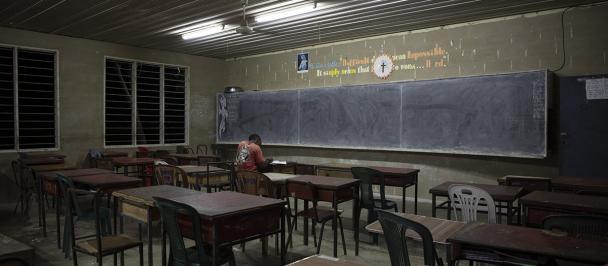In a lecture room at the Electrical Engineering Department of the Papua New Guinea University of Technology in Lae, Morobe Province, participants of a three-week long ‘Renewable Energy’ Training stood in awe as the lecturer demonstrated how a smart electricity grid works.
Harnessing the power of renewable energy
January 28, 2024

Part of the practical session, participants successfully installed solar panels at the Papua New Guinea University of Technology Security Office

Participants inside the Electrical Engineering lecture room
As the students gathered around the device, the lecturer explained how the grid could simultaneously utilize wind, hydro and solar power to produce clean energy. When one energy source turned off, the others would continue to produce power and ensure continued electricity supply. The lecturer asserted that such grids were key to expanding electricity access in Papua New Guinea, where only 20% of the population currently enjoys regular access to electricity.
The training was held under the renewable energy component of the European Union-funded “Support to Rural Entrepreneurship, Investment and Trade” (STREIT) programme, which aims to expand electricity access in the rural areas of East and West Sepik Provinces through renewable energy solutions. As one of the implementing agencies of the programme, UNDP has installed solar photovoltaic systems to schools and health facilities in six sites in the targeted provinces.
Over 30 seasoned electricians, engineers, PNG Power employees, and teachers from East and West Sepik Provinces attended the training in Lae to gain the necessary skills to maintain these systems and to become solar energy experts in their respective communities. This marked the third and final training for the participants since 2021.

Mr. Lalu explaining to the training participants his role in the Nagam solar project in East Sepik Province
Mr. Wilson Lalu, an electrician with over 40 years of experience, says that the training gave him a new perspective on renewable energy. Mr. Wilson currently works on one of project sites of the STREIT Programme in Nagam, East Sepik Province. Under UNDP’s leadership, the project has installed 176 solar panels and connected them to a battery system that provides continuous power to all dormitories, classrooms and staff houses in a local school.
“My involvement at Nagam was during the commissioning of the system. Being an electrician, I had never worked on solar systems like that before. The training has given me a new perspective on the industry,” Mr Lalu said.

Mr. Bobby Tagen
Computer science teacher and licensed electrician form Vanimo Secondary School, Mr. Bobby Tagen, also participated in the training. In 2023, UNDP installed a solar photovoltaic system on the school grounds and connected it to the main grid operated by PNG Power. The initiative ensured reliable electricity access to the school’s over 800 students.
“The system has been working perfectly since it was installed in 2023. This training taught me about how such systems can be kept running for a longer period of time. This knowledge will help me maintain the system in our school and motivated me to continue promoting the use of solar power in my community,” says Mr. Tagen.
The training was facilitated by the University of Technology’s Sustainable Energy Research Institute (SERI). The Director of SERI, Professor Dapsy Olatona, hopes the training will yield positive results for the communities of the participants. “Our aim is that the participants will return to their villages and take part in installing renewable energy systems, particularly solar systems, in a manner that SERI has taught them.”
The Government of Papua New Guinea has set a target of connecting 70% of Papua New Guinea’s population to renewable electricity by 2030. By 2050, the Government hopes to have reached universal electricity access throughout the country.
UNDP hopes to contribute to this aim through its various initiatives in the country. In addition to its activities under the STREIT programme, UNDP is currently constructing a 1 megawatt solar farm in the Autonomous Region of Bougainville. The construction is funded by the Government of Japan and the engineers working on the project will undergo the same training at the PNG University of Technology in Lae.

Solar panel used in Osima Village, West Sepik Province, to charge mobile phones and lighting. Participants will now become solar energy experts in their communities to improve on this type of basic system.
“UNDP is committed to supporting the Government in increasing access to affordable, reliable and sustainable energy throughout Papua New Guinea. Without enhancing access to clean energy, we cannot succeed in our efforts to eradicate poverty, reduce inequalities and enhance environmental sustainability in Papua New Guinea,” stated UNDP Resident Representative, Mr. Nicholas Booth, after the training.
“The sustainable future of our planet depends on countries making a successful transition onto greener and cleaner forms of energy. The European Union is proud to finance and support this initiative that will enable Papua New Guinea to reduce its reliance on fossil fuels and expand electricity access to some of the most vulnerable communities in the country,” added the European Union Ambassador to Papua New Guinea, H.E. Jacques Fradin.

 Locations
Locations








